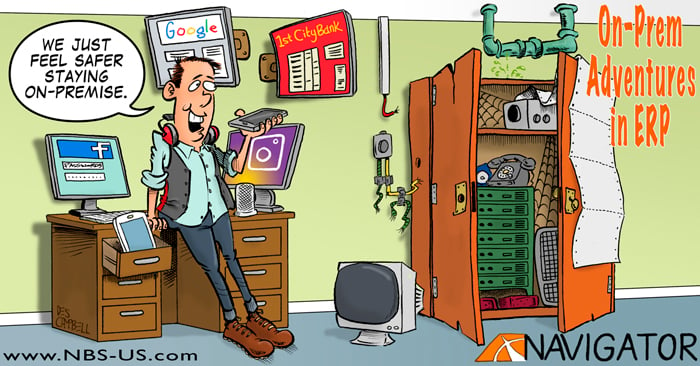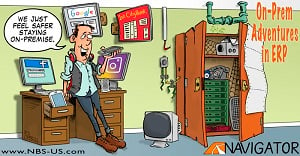
On-Premise vs. Cloud ERP: Which Is Better?
Businesses in the life sciences and biotech sector need efficient operations and speed to market. Enterprise resource planning (ERP) systems ensure that a business can stay lean and competitive while also enabling flexibility and scalability to support growth and long-term goals.
Small or large, businesses tend to have similar needs when it comes to ERP: streamlined workflows through automated processes, visibility into operations, and stronger data analytics, to name a few. However, the choice between an on-premise ERP solution and one based in the cloud is not the same for all businesses.
Cloud ERP vs. On-Premise ERP
Both cloud-based ERP and on-premise have their pros and cons. Some businesses favor on-premise solutions if they want more control over their own systems and the platform’s overall security. An on-premise solution can be easier to modify, which can be important for niche industries such as life sciences and biotech.
These benefits, however, come with more ongoing hardware and software maintenance requirements, and a greater reliance on IT for support. In addition, while some enterprises may find the limited customization capabilities in cloud-based solutions frustrating, in the long run, this apparent drawback actually improves cost, nimbleness, and overall process effectiveness. Mobility can be an issue with on-premise solutions, whereas the cloud is available to users wherever they are. For these reasons, forward-thinking life sciences firms frequently end up with a cloud solution.
Advantages of Cloud-Based ERP
As some of the limitations and barriers to on-premise solutions have become more apparent, more businesses are turning to cloud solutions instead. In fact, the cloud-based ERP market is projected to reach $32 billion by 2023. The reasons are many.
Lower Upfront Costs
A cloud-based ERP platform doesn’t require any upfront capital expenditure, which could run in the millions for an on-premise solution.
Cloud-based solutions are offered via an affordable subscription fee, which allows a smaller business to build an ongoing operational expense into its budget rather than requiring a huge initial capital expense. A limited budget doesn’t mean a business will sacrifice any functionality when it employs a cloud ERP solution; it frequently only means a faster setup, easier support and less initial financial outlay.
Easier to Implement, Easy to Use
In the past, ERP was viewed as an undertaking reserved for large companies because rolling it out was such a large project. Cloud ERP has been a game-changer for this calculus because implementation time is minimal, and the cloud vendor, rather than the business itself, handles all the hardware and software management.
This makes for easier configuration and shorter training times. A rollout that once typically took more than a year now can be completed in as little as a few weeks. Providers have developed solutions with specific industry needs baked in.
Less Burden on In-House IT
Biotech companies have enough to juggle without adding the complexities of building a complicated IT infrastructure and managing the skilled staff needed to maintain it.
Cloud-based ERP requires less maintenance and fewer IT resources; the solution provider handles all the back-end needs of the system. Because the IT footprint is simplified, in-house IT staff can focus more on strategic projects and less on routine system maintenance.
Automatic Updates
A large part of regulatory compliance for life sciences and biotech firms is tied to ensuring that software and processes are up to date. Cloud providers roll out automatic software updates seamlessly with minimal disruption or downtime.
The software stays better secure in this environment, and it reduces IT headaches when things go wrong. Furthermore, these updates are included in the price of the subscription, so there’s no need to budget for additional upgrade costs—something that can sometimes be substantial with on-premise ERP solutions.
Flexibility and Scalability
Cloud-based ERP systems are comprehensive yet flexible. You can get out-of-the-box business processes for all your departments and operations, and they can be easily adapted to your organization’s specific needs at the same time.
Just as important, IT resources can be scaled up and down as needed with a cloud solution. Today’s cloud-based ERP comes with built-in integration tools and an architecture that can be integrated with third-party systems, and there’s no worry about running out of storage or maxing out hardware. The ERP system can scale to meet your business needs today while providing growth capacity down the line.
A Highly Accessible and Connected Platform
When ERP is in the cloud, you can ensure mobility and connectivity much more easily than you can with an on-premise system.
Cloud-based solutions can be accessed by users wherever they happen to be, offering opportunities for greater productivity and efficiency. Furthermore, smaller businesses can integrate with e-commerce channels and connect to online supplier networks just as easily as larger firms can, which aids competitiveness. For the same thing to happen with on-premise ERP, there are a lot more fiddly integrations and third-party connectivity software that may or may not get updated as cloud services and other systems evolve.
The Cloud: a Clear Winner

While not every business will want a cloud-based ERP solution, most will; the advantages simply far outweigh the disadvantages. That’s why ERP vendors are ultimately moving in that direction with product upgrades. So instead of going with the old model of ERP delivery, start with a new one that is much improved on what came before.
If you would like help figuring out which solution would best suit your business needs, contact one of our consultants at (801) 642-0123 or by emailing info@nbs-us.com.

